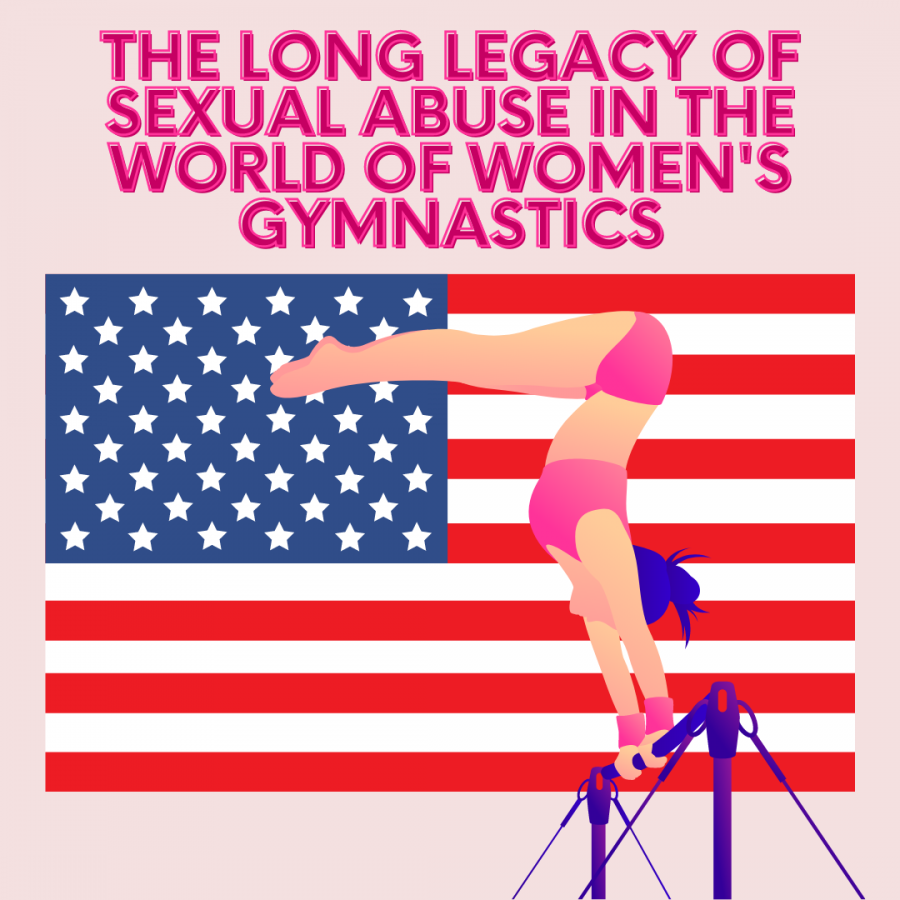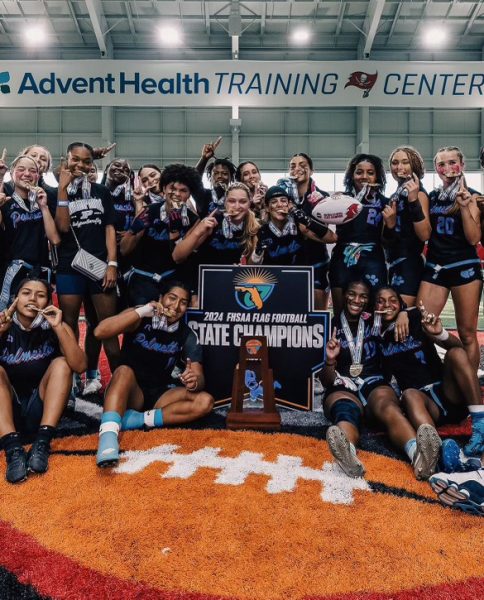The Long Legacy of Sexual Abuse in the World of Women’s Gymnastics
October 18, 2021
Disclaimer: This article contains topics that could be sensitive for some readers.
The 1996 Summer Olympics in Atlanta marked a turning point in the world of women’s gymnastics. For the first time in history, the U.S. won the team gold medal, triumphing over their Russian adversaries who put up an intense fight throughout the whole competition. Although this was a great milestone for team USA, how the famed Magnificent Seven won the gold medal is much more remarkable. Even those who were not alive to witness the games know about Kerri Strug and how she vaulted on a severe ankle injury, cheered on by the famous words of her coach, “You can do it, Kerri! You can do it!”.
In a feat of strength, perseverance and athleticism, she did it, perfectly executing her vault and landing on one foot to secure a gold medal for Team USA. However, after her pristine landing and salute, the then 19 year-old fell to the ground, gritting her teeth in pain having sacrificed her ankle and gymnastics career for a medal. One of the first to come to her aid was trusted team doctor and medical coordinator, Larry Nassar, who is now a convicted child sex abuser with over 330 sexual assault accusations lodged against him.
The accusations include ones from notable Olympic champions such as Simone Biles, Gabby Douglas, Aly Raisman and more. Behind almost every Olympic gymnast for the past 30 years has been Nassar, who provided medical treatment and abuse to many elite athletes. Today, many of these young women still suffer from trauma as a result of the abuse they endured as children.
“One of the primary long-term effects is the ability to trust. Besides the trauma-related effects, other long-term effects are the increase of having a higher chance of suffering other mental health disorders… The one that is most affected in the long term is the effect that it causes on intimate relationships. This can happen in many aspects and different kinds of relationships; for example, intimate/sexual relationships can become either hypersexual or asexual,” Marriage and Family Therapist Intern and certified trauma therapist Fhara D. Guadalupe said.
Through kindness and laughter, which often contrasted the cold cruelty of abusive coaches, Nassar created an initial trust in his patients that allowed him to groom and manipulate them. He would make jokes and often sneak food to gymnasts who faced harsh treatment like body-shaming and emotional abuse from their coaches. The gymnasts saw Nassar as a kind adult in a sport full of cruel people.
“Gymnastics already had a reputation for not having the nicest coaches. From experience, I can agree to that. People thought of gymnastics to have uncaring, rude, and mean coaches,” former level seven gymnast and Palmetto freshman Julieta Zengin said.
Nassar produced instructional videos for the now defunct website www.GymnasticsDoctor.com, where he used anatomical vocabulary and professional demeanor. However, investigators who watched the videos back with knowledge of his abusive nature found the frequency and ease at which he touched the children alarming. It was clear to them that Nassar had secretly sexually abused his patients under the guise of physical therapy and rehabilitation, but many questioned how he was able to get away with it for so long, especially when the abuse often occurred in the presence of parents.
With the walls of his office plastered with pictures of famous Olympic gymnasts, patients often found Nassar impressive and could only hope to become one of the stars on his wall one day. As children, many of the young gymnasts did not want to believe or tell anyone that Nassar had done anything wrong because that would not only jeopardize their Olympic dreams, but the careers they had trained their whole lives for. The only way to the Olympics was through Larry Nassar.
“In my experience from assessing and seeing trauma victims, the reasons [for not saying anything] are quite different and might be associated to the age of the victim. Most of the children perceive that they somehow deserve this trauma, and since they are dependent on the adults around them, they are scared to lose what they have. When it comes to recurrent victims, meaning children that have been abused by more than one person, they might stay quiet because they think that their life will get worse if they talk about it,” Guadalupe said.
Despite the method in which Nassar took advantage of gymnastics culture and the vulnerability of young girls, several victims did speak out against him, but coaches, Michigan State University and USA Gymnastics often silenced their voices.
Women and young girls began speaking up about Nassar’s abuse as early as 1997, but many accused the girls of lying or assured them that he had just performed a standard medical procedure, not an abusive act. In turn, many gymnasts subsequently returned back to Nassar for treatment.
In 2004, Michigan State University Police investigated a case in which a woman claimed Nassar had sexually assaulted her during a medical treatment. However when the prosecutor’s office received the case, they declined to charge him at that time, allowing for Nassar to continue working with children.
“No one deserves to be abused in any sense, not only him [Nassar] but the staff who let all of this happen. They are as guilty as the one who committed the crime. When it comes to the victims, the system failed them, and the sport [of gymnastics] failed them. Everyone that is involved in their professional life failed them,” Guadalupe said. “Gymnastics is a stressful, complex, and very competitive sport that increases the chances of emotional dysregulations and the need for support. When all of the support behind your success does not trust your statements or put them aside and ignore them, they have failed you. These women are not only survivors; they are an example that sexual abuse needs to be reported, and abusers need to be accountable for their actions.”
For Maggie Nichols, also known as “Athlete A,” who in June of 2015 became the first known gymnast to report Nassar to USA Gymnastics, the organization took steps which protected Nassar over Nichols. Her family and herself received guidance to remain quiet about the allegations to not jeopardize the ongoing investigation by the Federal Bureau of Investigation. These orders came from President and CEO of USAG, Steve Penny.
There was a five week delay between Nichols’ report to USAG and when Penny forwarded the report to the FBI. For 13 months between the FBI’s receival of the report and his arrest, Nassar continued to work at Michigan State University and may have molested over 100 more girls.
In the states of Indiana, where the USAG headquarters is located, Texas, where the national team training center previously was, and Michigan, where Nassar resided, immediate reporting of child sexual abuse is mandatory under the law. Due to the fact that they were previously made aware of it through internal emails, Penny, Karolyi, and Rhonda Faehn’s — the Senior Vice-President of USAG — hesitated to report the abuse as illegal.
Additional emails surfaced in which Penny, looking to protect the image of USAG, offered a job on the Olympic Committee to one of the FBI agents working on the sexual abuse investigation. Since then the FBI director, Christopher Wray, has apologized to all of Nassar’s victims for the organization’s handling of the case.
Nichols, who had been an 2016 Olympic hopeful, failed to make it to the Olympics as a team member or alternate that year as a result of her coming forward. This occurred despite her placing second in the all-around at the World Championships in 2015 and sixth in the Olympic Trials.
Although USAG has never officially attributed her exclusion from the team to a particular reason, fans speculate that her previous knee injury and accusation of Nassar may have played a role in the team selection.
After Olympic trials, Nichols retired from Elite gymnastics and became a NCAA athlete competing for the University of Oklahoma. She became the NCAA National All-Around Champion in 2018 and again in 2019. Officials arrested Penny in October of 2018 based on allegations of tampering with evidence. He currently awaits trial for which he could face two to 10 years in prison if convicted. He denies a cover-up occurred; however, Penny had documents delivered to him from Karolyi Ranch, which served as the national team training center till 2016, where many gymnasts faced sexual abuse.
When Jamie Dantzsther, Jessica Howard and Rachel Denhollander told their stories of abuse to The IndyStar in the summer of 2016, it was the first time the public heard of Nassar’s sexual abuse.
“Knowing that some of the best female gymnasts in the world were being sexually harassed, it came as a real shocker to the whole gymnastics society. I can speak for most people in gymnastics when I say that it made people scared to come to train because it made many people fear their coaches and the staff at the gym. More parents came to the practices at our gym to keep an eye on their young kids. Also, some kids were forced to quit because their parents were worried that a Larry Nassar might be training their children,” former level nine gymnast and senior Carson Sleeman said.
Nassar had previously retired in 2014 to run for the school board and focus on his hometown medical practice in Holt, Michigan, but declared that he would remain the team doctor for the 2016 Olympics. In September of 2016, The IndyStar ran their story exposing USAG’s coverup, Denhollander filed a lawsuit against Nassar, and he was subsequently terminated from MSU.
In the same month, police executed a search warrant on Nassar’s Michigan home based on allegations that he had performed medical treatments and abused athletes in the basement. Investigators found over 37,000 pieces of explicit child pornography on hardrives in his trash during the search. For unrelated reasons, police arrested and charged Nassar with three counts of first-degree criminal sexual conduct with someone younger than 13 in November of that year, but was released on bond. In December, officials indicted Nassar he on child pornography charges and denied him bond.
In July of 2017, an outpour of Nasser’s survivors came forward and both federal and state charges began to pile up against him. Nassar’s legal team began making plea deals for the different charges and he agreed to plea guilty to possession of child pornography, willfully destroying evidence and criminal sexual conduct in exchange for dropped charges and a sentencing deal.
In 2018 at his different sentencings, over 150 survivors of his abuse provided testimony and the judge charged him with the maximum sentence. Nassar received a federal prison sentence of 60 years for the charges of child pornography, a 40 to 175 year sentence for the criminal sexual conduct charges in Ingham County and a 40 to 125 year sentence in Eaton County, which he is serving in Florida.
“I feel as if justice is served and since he deserves to be in prison for the rest of his life. However, it’s scary to think about how many people like Larry Nassar might be out there,” Sleeman said.
Through the IndyStar investigation, officials learned that Olympian McKayla Maroney and others signed Non-Disclosure Agreements. Since then, USAG has since publicly stated that they do not plan to seek fees or legal action against gymnasts, such as Maroney who choose to speak out.
“It’s crazy to think how many people’s stories about Nassar were kept quiet. To the survivors I would say how proud I am. It still shocks me to think of this news up to today. How could something like this happen and be kept in the dark? His life long prison sentence was deserved,” Zengin said.
During January of 2018, the entirety of the USAG board resigned and the Karolyis’s permanently closed their ranch and training center.
Recently, current and retired Elite athletes such as Simone Biles, Aly Raisman, McKayla Maroney and Maggie Nichols testified to the U.S. Senate Judiciary Committee on the failures of USA Gymnastics and the FBI in investigating the reports of abuse. Maroney claims that FBI agents took more than a year to document the abuse she endured and when they finally did, the reports did not accurately portray her experiences. Agents proceeded to be dishonest during interviews in order to cover up their investigative mistakes. Lisa Monaco,Deputy Attorney General of the United States, chastised the agency who has since issued an apology for the mishandling of the case.
“No one should ever have to go through what these brave gymnasts had to endure. If anyone ever has any issues with sexual harassment, I plead that you stand up for yourself or talk to others for help,” Sleeman said.
If you or someone you know is a victim of sexual assault, contact your local police and/or school counselor.














